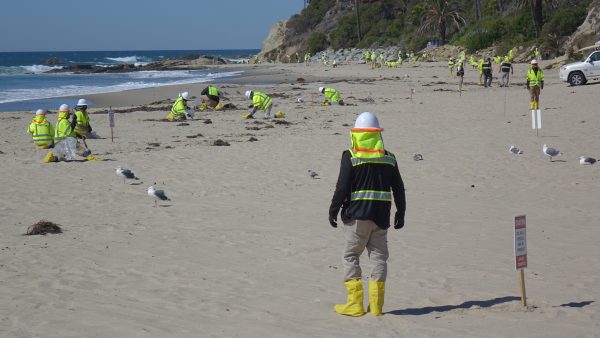
Southern California shorelines impacted by the October oil spill have been restored to their original condition, the U.S. Coast Guard-led Unified Command tasked with overseeing the clean-up announced Tuesday.
Just under three months since the spill response started, officials said they will continue to monitor tarballs and oiling incidents along the coastline.
“The collaborative efforts of the first responders, public safety professionals, assessment teams, and response workers were critical to ensure our waters, beaches and wildlife were cleaned to the highest standard,” U.S. Coast Guard Capt. Rebecca Ore said in a press release.
The Unified Command also includes the California Dept. of Fish and Wildlife Office of Spill Prevention and Response, the County of Orange, the County of San Diego, and Amplify Energy. Over 1,800 people have been involved in the clean-up.
Compared to Huntington Beach and Newport Beach, Laguna Beach saw a relatively light oiling of its shoreline in October but any marine damage was devastating to those who relax on or near the ocean. Laguna Beach reopened public access to the shoreline and ocean following an 11-day closure forced by the spill.
“We’re relieved we didn’t see more of a local impact,” Mayor Sue Kempf said. “I credit the very good monitoring by all of the various agencies. “From day one, our marine safety department has been diligently monitoring and looking for any evidence of oil. I think that’s been impressive.”
Nancy Caruso, an Orange County marine biologist and founder of the nonprofit Get Inspired, surveyed 12 reefs off Newport Beach and Laguna Beach in late October to check on the ecosystem’s health. Lobsters, juvenile sharks, sea anemones, and other marine wildlife appeared to be in good shape.
“As far as the macro-world underwater, there doesn’t seem to be impacts from the oil or tar,” Caruso said.
The big remaining question is how the spill impacted microorganisms like zooplankton and phytoplankton that are at the bottom of a complex food chain. It could take years for scientists to get their arms around this query.
Caruso hopes that state officials will require Amplify Energy to set aside money for scientists to monitor these kinds of species for years. This work is already being done by UC Irvine assistant professor Joleah Lamb.
The involved pipeline is still shut down. Federal pipeline regulators have approved Amplify Energy’s proposed pipeline repair and procedure to flush the remaining oil product from the line.
The public is asked to continue reporting any sizeable sightings of oil or oily debris to the National Response Center hotline at 1-800-424-8802.




